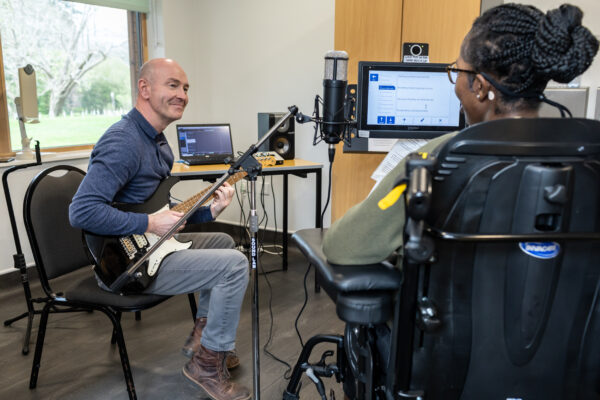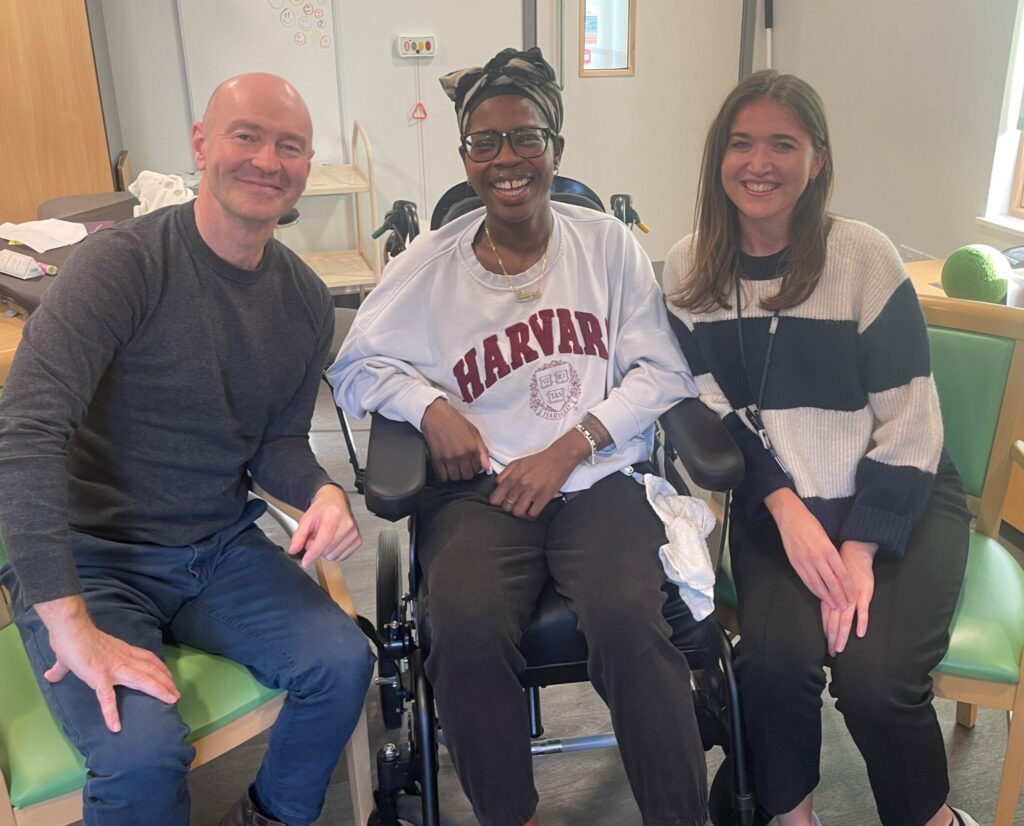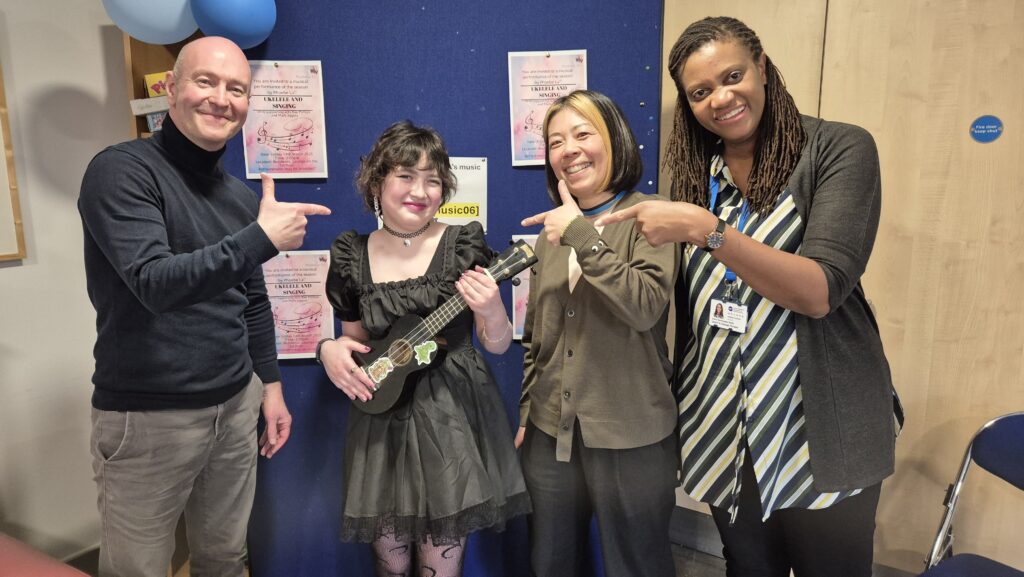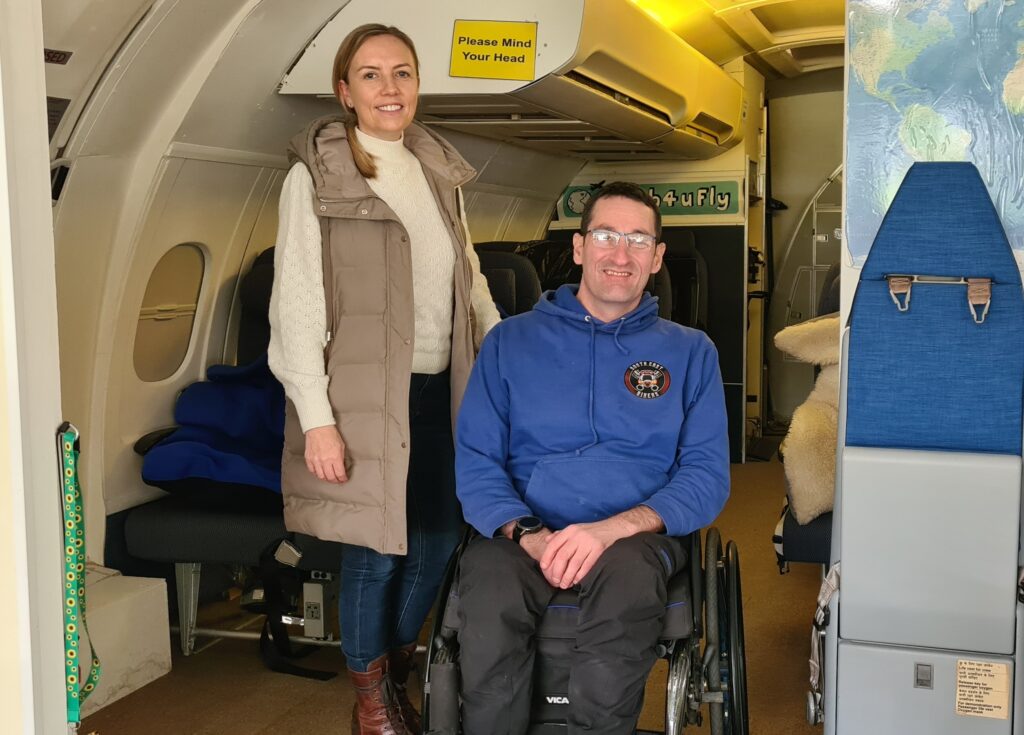Mark Jiggins, Occupational Therapist at the Care and Rehabilitation Centre, talks about how impactful music-based therapy has been to support a client’s OT and other therapy goals.
“I was approached by my Speech and Language Therapist (SLT) colleague to see if we could develop a music-based therapy programme for RA, to motivate her and reinforce what she was working on in her OT, physio, SLT and psychology sessions. From an OT perspective this was a purposeful activity that used a lot of planning skills and looked for RA to take responsibility and be involved in every part of the process.
RA uses an AAC device to communicate. It was therefore important that the SLT, who knew RA well, helped to establish communication between us, so we could build a rapport and work together well.
We started by planning what we were going to achieve, setting goals around different stages and working out what we wanted to achieve at the end of each session. This involved looking at what the tempo would be, chord progressions and what instruments would be involved such as drums, orchestral, guitars, bass, piano etc. Then we built the song from scratch.
Some sessions were just planning which aids cognition and executive function, as well as planning time keeping as well, as we had to work around feeds and other session times. Her ability to sustain attention and focus for an hour really developed well. We also looked at the set up with her chair which was very important and positioning and how she would be able to hold and use percussive instruments. RA was very involved throughout the whole process – she literally bangs the drum – she is an amazing, unique individual.
OT goals summary:
- To improve range and precision of movement in upper limbs
- To incorporate upper limbs into percussive tasks
- To engage in a purposeful activity that can be carried over into RA’s new environment for further exploration
- To promote socialisation and quality of life
- To be actively involved in every aspect of the task
In the sessions
We have been working with RA on this project since October 2022 and in that 12 month period we have developed 4 songs together, as part of a small team that included RA, me, Libby her SLT and 2 Psychology Assistants. This has given her responsibility and required her to make choices which aids cognition, as well as recalling what was done from week to week.
She was also very much involved in the creative writing of the lyrics, which enabled her to express how she was feeling. Through the AAC device and working with us, she was able to communicate how she felt, as well as provide both background lyrics and whole verses for the songs.

From the first session, RA has been heavily involved in each aspect of creating these pieces of music; tuning the guitar – indicating non-verbally through pointing with her index finger and raising or lowering her head and choosing the beat, the bass and the melodies. She has also recorded vocals for each track and played percussive instruments such as the tambourine or xylophone.
This was her motivation to attend as she got a lot out of it. It was an important part of the day.
Progression has been observed across multiple areas.
We have seen significant progress in RA throughout this project. Her upper limb movement has improved significantly by playing the percussive instruments, building on what is being done with physiotherapy. Her functional ability of her left hand really improved. She is also very decisive and has a good ear for music.
The project, whilst being very creative has also been very impairment based, focusing on how she has improved her functional abilities, behavioural and emotional abilities and mood – it’s been a purposeful activity and very complete as its incorporated lots of aspects of her rehabilitation.
She is very determined – for trips she can now put her own seatbelt on- and she is fiercely independent. RA played the tambourine and xylophone on the recordings and was adamant she didn’t want help when she was doing it. She also learnt how to compromise and the skill of the team was important here, to clearly explain reasons when compromise was needed, without being patronizing. She was so involved in everything and it had to be a good standard for her to be happy.
She has managed to add some backing vocals and lyrics using her AAC device. Her ability to hit notes and hold notes got better and better, as well as her saliva management and breathing. She has also improved the intelligibility and duration of her vowel sounds suggesting improved lip positioning due to increased muscle strength and coordination. Throughout the sessions, RA has begun to communicate through mouthing and attempting to voice words, and appears less dependent on her AAC devise to express her thoughts and opinions. She used to not be able to produce any sound, so being able to hold a note now is quite amazing.
We have seen a general increase in her confidence and she has maintained a constant high level of motivation. I would love to do it again. Incorporating music into therapy has been really good. Music has been used to help RA with several different aspects of her rehabilitation – it’s a very bespoke approach to therapy for the right person.”
RA feedback:
“I think the sessions have been excellent with it being Libby’s (SLT) idea to bring Mark (OT) in as well, who I must say has been fantastic. I literally can’t wait for Friday’s, it is my favourite day because of the music we produce. It is truly amazing.”


